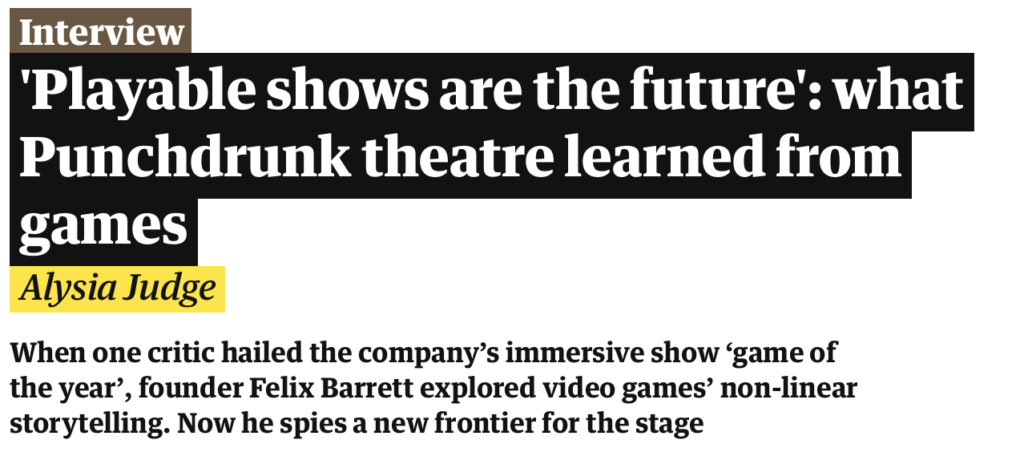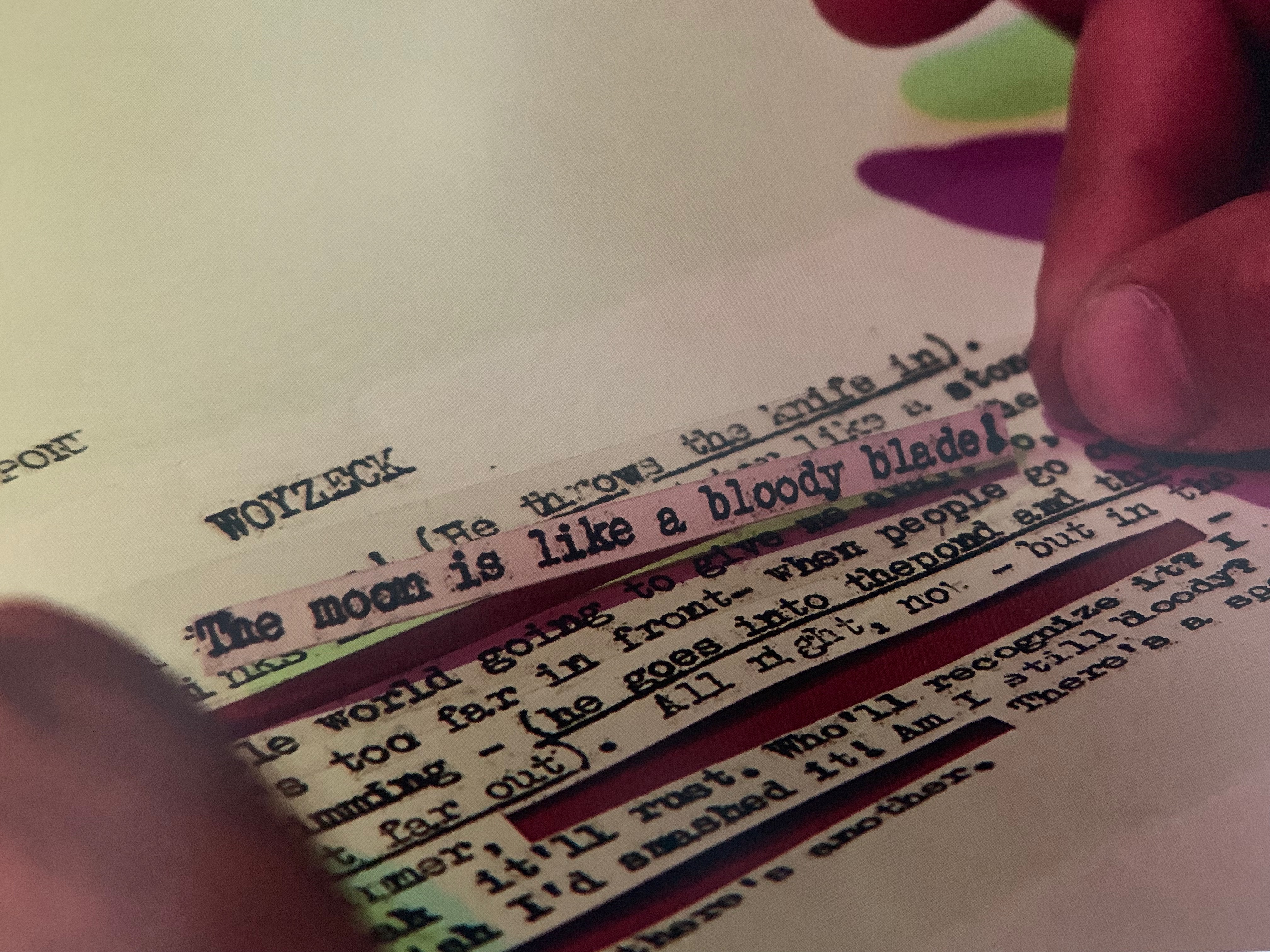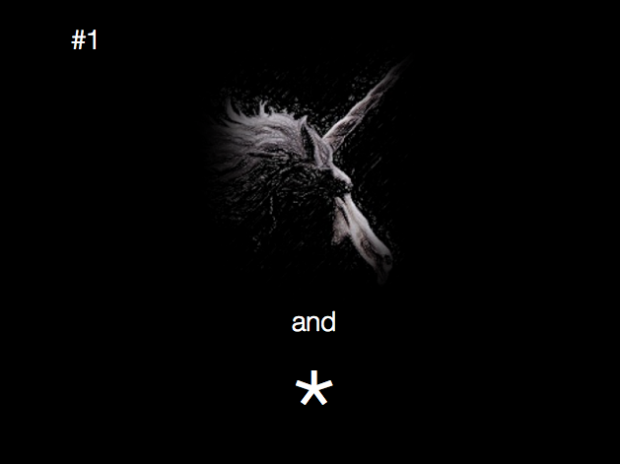What is the appropriate reaction when you discover your words became a small part of history, and maybe influenced the future, for something you hold dear?
Last Friday on the Giant Beastcast, Dan Ryckert recounted his recent first trip to Sleep No More. (The discussion starts around 48:00.) I appreciated the conversation happening on a gaming podcast because the connection of the Punchdrunk show to gaming concepts has always been part of my worldview. Michael Abbott’s post drawing those parallels was part of what drove me to the show originally. I was so enamored with the execution of this theatre/game hybrid, I named Sleep No More my “Game Of The Year” for 2011 over titles like Bastion and Skyrim. (The piece also included what could be charitably called a walkthrough as well as a list of achievements.)
This morning, with the memories of SNM still dancing in my subconscious, I finally cracked open my copy of The Punchdrunk Encyclopaedia. Published this past December, the book covers the history of Punchdrunk, their projects, and their immersive theatre design concepts in an enjoyable non-linear way. The encyclopedia format, with cross-references between entries and occasional full-page related topics, allows you to wander between concepts like you would an immersive set.
My read was fairly linear, going A-Z and spending time on the concepts I wanted to know more about. And just as I was about to put the book down, at the “References and Further Reading” appendix, my eyes flicked to the corner and grew wide:

Why was I being referenced in the official history of Punchdrunk in any capacity? I quickly fired a text to Kathryn Yu, friend / managing editor of No Proscenium / my original shepherd into the world of immersive theatre.
After some random entry checks, I struck gold on the entry for gaming. With a closer read than my first pass, found this quote:
“We didn’t set out to build work to be like first-person computer games. Instead, as our productions became more intricate and detailed it was a lens through which audiences began to view and compare the work. We recognise that the work offers fully realised realities within which audiences are immersed. Immersion of this depth is addictive and those interested in gaming feel the work offers a physical alternative to gaming. Just as games are played many times over, audiences return again and again to Punchdrunk worlds; with Sleep No More, NYC, an audience member who frequented the production reviewed it as one of his top ten games [see Dickinson 2011].”
– Peter Higgin, Punchdrunk Director of Enrichment
Finding yourself referenced in a book without warning would’ve been enough to weird me out for the day. But then came a text from Kathryn: “I FOUND IT” and a link to a recent Guardian article:

This was a turn I wasn’t prepared for.
But something strange happened after Punchdrunk brought Sleep No More to New York in 2011.
“We had an amazing weird moment when the papers and blogs were doing their round ups of ‘best album of the year’, ‘best film of the year’ and so on,” [Felix] Barrett remembers. “In one of them, Sleep No More got ‘best game of the year’”. The article described the show using gaming vocabulary and vernacular. Its hidden secrets were “Easter eggs,” while discovering a new floor was “levelling up”, and the choice of where to go made it an “open world”.“When we were described as a video game I started going back to games to find out more about them, to unpack it, and learn more about game mechanics,” says Barrett. He realised while Punchdrunk wasn’t “ever directly inspired by an open-world game”, open worlds give birth to choice, which creates a new way to tell stories – similar to what he was trying to achieve in theatre.
– Alysia Judge, “‘Playable shows are the future’: what Punchdrunk theatre learned from games“
Some Googling reveals that I appear to have been the only person who ever declared the show “game of the year”. Which means Felix Barrett read that blog post and considered it an “amazing weird moment”.
Wait, there’s more:
“That crazy space between video games and theatre, I reckon is the next frontier. […] I’m taking literal game mechanics to enter theatre … That’s totally what we’re doing. Asking questions in that space. […] I actually don’t think there’s a vocabulary for it yet. For a while, ‘immersive theatre’ was bandied about, but whatever this new thing is called, playable shows are the future.”
– Felix Barrett
So…Felix Barrett read that blog post, considered it an amazing weird moment, and it may have triggered him down a path of deeper consideration of how to marry game mechanics theater, and that’s what Punchdrunk is working on now?
That’s one hell of a one-on-one.
I lay no claim to originating the idea of comparing immersive theatre to gaming. (Again, Michael Abbott’s post put the idea in my head long before I ever attended.) And I don’t dare believe that my words alone sent Punchdrunk down whatever creative rabbit hole they’re currently exploring.
But there’s something bewitching about my words echoing back seven years later in this way, in the book in my hands and the subhead copy on my screen. To know that I left even a small imprint on the Punchdrunk team, in the subconscious way that their shows did on me, makes me glow a little.
(Felix, Peter – if either of you somehow end up back on this small corner of the internet and read this, I’m not sure what to say except: thank you both.)

